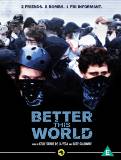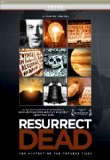
Activist documentaries are quite the rage these days. Everyone has their cause and some think that cause is worth documenting as a movie. Most of these movies are of little interest to me. For example, If a Tree Falls was nominated for an Oscar in the best documentary category and I was convinced that if the Academy handed the little gold guy to that snoozer then it was proof that those in the Academy love trees more than they love good movies. Harsh, I know. Every once in a while a documentary covers a politically charged topic and I like it. Better This World isn’t one of those. It is a documentary I love.
Wasting no time to setup the premise of the film, we’re immediately thrown into the mess that is the 2008 Republican National Convention (RNC). Aside from John McCain winning the nomination in 2008, there were protests brewing in St. Paul, Minnesota where the RNC was being held. Right or not, numerous federal, state, and local law enforcement agencies feared these protests were going to escalate into violence, which means trouble in a post 9/11 world. And the trouble comes not only in overzealous protesters but in their government employed counterparts overreacting in the name of security. Mixing protesters weary (at best) of their government with police forces loaded with and prepared to use various weapons on the protesting masses makes for a disastrous recipe. Add on top of that two friends from Midland, Texas, David McKay and Bradley Crowder, with close ties to a charismatic social activist Brandon Darby who encourages his protégés to ratchet up the action, even if it means taking up arms. McKay and Crowder comply by creating molotov cocktails (aka fire bombs) they consider using on strategic non-human targets. The two friends never get that far. Crowder was held in custody from an earlier arrest and McKay had a swat team on him before he could do anything.
The story seems rather straight forward until some key details are expertly revealed throughout the fast paced film. The surprises are too good to spoil. Let’s just say that not everything is as it seems, and not all of it is in favor of McKay and Crowder, who most would assume are handled most sympathetically throughout. The spoilers are so good that there is even one in the credits. I couldn’t believe that one of the biggest reveals was saved for credit rolling material. It’s a gutsy move and one that pays off by leaving the viewer unsettled one last time.
The disturbing results of the US justice system and the paranoid homeland security efforts are on full display. There are no winners, even though it would appear the government wins 90% of the time in criminal trials. The tactics used by the prosecution are underhanded, not to mention the highly questionable actions of those enforcing the laws and catching the suspects. Even so, kudos to the filmmakers (Kelly Duane and Katie Galloway) for not letting the two young men off the hook. Crowder and McKay made some poor choices along the way and thankfully the film allows the friends to make this admission and contemplate a bit on the unfortunate (not to mention unjust) results.
Whether one agrees with their left leaning politics or not, it’s hard not to feel empathy for Crowder and McKay in the latter half of the film. The two twenty-something friends are not simply used as exhibits A and B in a case against the US justice system and overreaching homeland security, they are shown as people who have families and loved ones. The repercussions for Crowder and McKay are deeper than a lost battle for the cause they believe in. These young men are faced with hard prison time away from loving families and friends.
Unlike its counterparts, Better This World makes the most of its activist focused material and tells a compelling story in a manner worthy of the source material.
[xrr rating=5/5 label=” “]
This post is part of my Way late reviews. Read more reviews here.
[vimeo width=”500″ height=”281″]http://vimeo.com/22076812[/vimeo]








